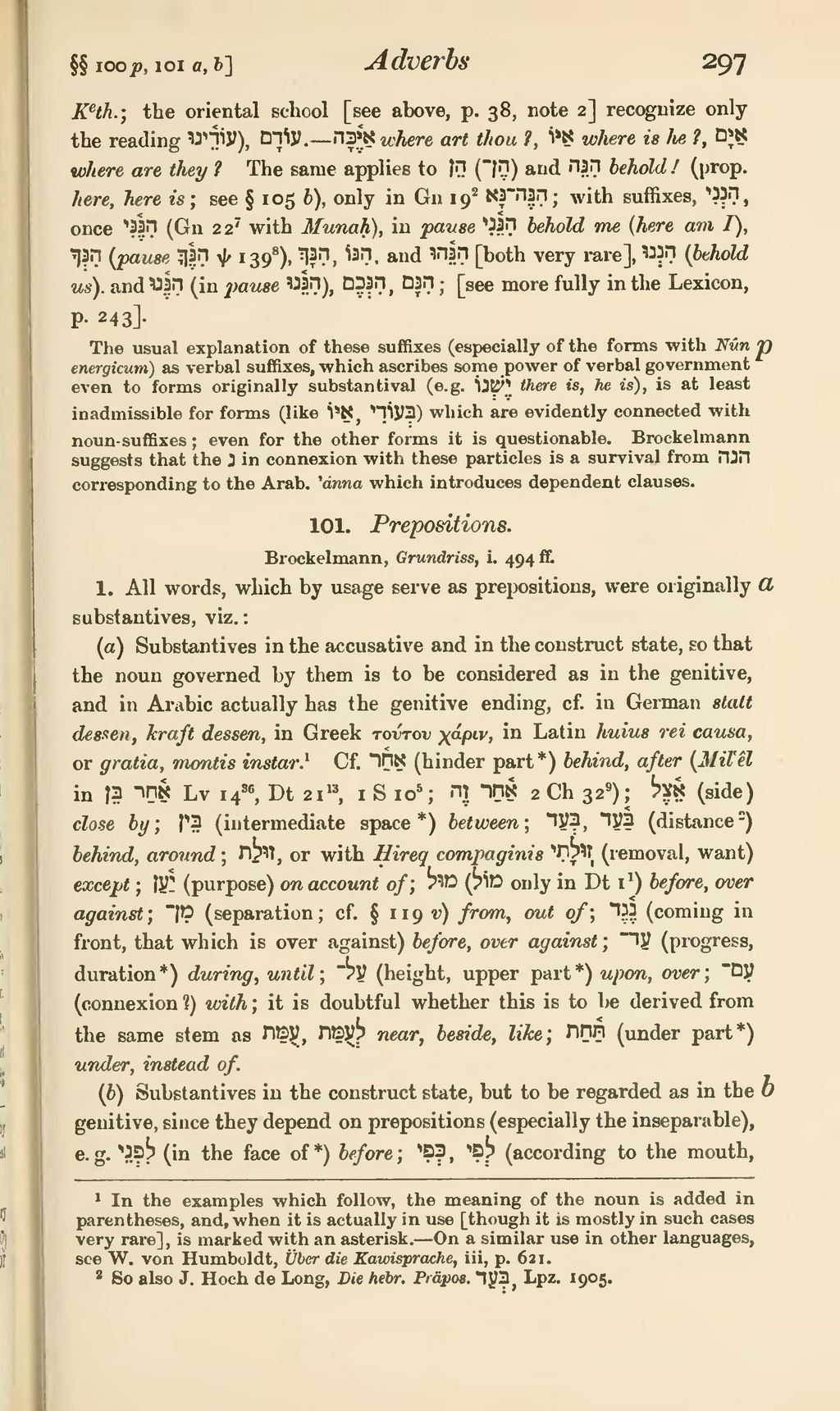Keth.; the oriental school [see above, p. 38, note 2] recognize only the reading עוֹדֵ֫ינוּ), עוֹדָם.—אַיֶּ֫כָּה where art thou?, אַיּוֹ where is he?, אַיָּם where are they? The same applies to הֵן (הֶן־) and הִנֵּה behold! (prop. here, here is; see § 105 b), only in Gn 19 הִנֶּה־נָּא; with suffixes, הִנְנִי, once הִנֶּ֫נִּי (Gn 22 with Munaḥ), in pause הִנֵּ֫נִי behold me (here am I), הִנְּךָ (pause הִנֶּ֫ךָּ ψ 139), הִנָּךְ, הִנּוֹ and הִנֵּ֫הוּ [both very rare], הִנְנוּ (behold us), and הִנֶּ֫נוּ (in pause הִנֵּ֫נוּ), הִנְּכֶם, הִנָּם; [see more fully in the Lexicon, p. 243].
[p] The usual explanation of these suffixes (especially of the forms with Nûn energicum) as verbal suffixes, which ascribes some power of verbal government even to forms originally substantival (e.g. יֶשְׁנוֹ there is, he is), is at least inadmissible for forms (like אַיּוֹ, בְּעוֹדִי) which are evidently connected with noun-suffixes; even for the other forms it is questionable. Brockelmann suggests that the ן in connexion with these particles is a survival from הנה corresponding to the Arab. ʾánna which introduces dependent clauses.
Brockelmann, Grundriss, i. 494 ff.
[a] 1. All words, which by usage serve as prepositions, were originally substantives, viz.:
(a) Substantives in the accusative and in the construct state, so that the noun governed by them is to be considered as in the genitive, and in Arabic actually has the genitive ending, cf. in German statt dessen, kraft dessen, in Greek τούτου χάριν, in Latin huius rei causa, or gratia, montis instar.[1] Cf. אַחַ֫ר (hinder part*) behind, after (Milʿêl in אַ֫חַר כֵּן Lv 14, Dt 21, 1 S 10; אַ֫חַר זֶה 2 Ch 32); אֵ֫צֶל (side) close by; בֵּין (intermediate space*) between; בְּעַד, בַּ֫עַד (distance[2]) behind, around; זוּלַת, or with Ḥireq compaginis זֽוּלָתִי (removal, want) except; יַ֫עַן (purpose) on account of; מוּל (מוֹל only in Dt 1) before, over against; מִן־ (separation; cf. § 119 v) from, out of; נֶ֫גֶד (coming in front, that which is over against) before, over against; עַד־ (progress, duration*) during, until; עַל־ (height, upper part*) upon, over; עִם־ (connexion?) with; it is doubtful whether this is to be derived from the same stem as עֻמַּת, לְעֻמַּת near, beside, like; תַּ֫חַת (under part*) under, instead of.
[b] (b) Substantives in the construct state, but to be regarded as in the genitive, since they depend on prepositions (especially the inseparable), e.g. לִפְנֵי (in the face of*) before; כְּפִי, לְפִי (according to the mouth,
- ↑ In the examples which follow, the meaning of the noun is added in parentheses, and, when it is actually in use [though it is mostly in such cases very rare], is marked with an asterisk.—On a similar use in other languages, see W. von Humboldt, Über die Kawisprache, iii, p. 621.
- ↑ So also J. Hoch de Long, Die hebr. Präpos. בְּעַד, Lpz. 1905.

